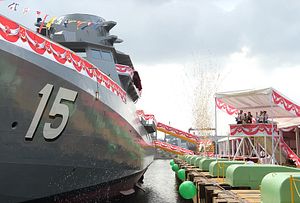On March 24, Singapore launched another one of its new locally built and designed warships. The vessel, which was unveiled at a ceremony attended by a host of Singapore defense officials and personnel, represented another step in the country’s ongoing naval modernization.
As I have been noting in these pages, one of the many manifestations of Singapore’s naval modernization over the years has been the replacement of its existing fleet of Fearless-class patrol vessels, which have been in service for over two decades, with locally built and designed Littoral Mission Vessels (LMVs) that represent a marked improvement over their predecessor.
Singapore’s defense ministry has characterized the LMVs as being “smarter, faster, and sharper,” and they also have the versatility to deal with a wide spectrum of challenges, ranging from counterpiracy to humanitarian assistance and disaster relief operations (See: “What Do We Know About Singapore’s New Warship?”).
The LMVs have been gradually unveiled since last year. The first, RSS Independence, was commissioned during the Republic of Singapore Navy’s (RSN’s) Golden Jubilee in May 2017 by Singapore Prime Minister Lee Hsien Loong, and two more – RSS Sovereignty and RSS Unity – were commissioned in November 2017. The other two previously launched LMVs, RSS Justice and RSS Indomitable, are undergoing sea trials.
On March 24, the RSN launched one more LMV at ST Marine’s facilities in Benoi. The RSS Fortitude, the sixth LMV to be launched, was unveiled by Minister for Education and Second Minister for Transport Ng Chee Meng in a ceremony also attended by Chief of Navy Rear Admiral Lew Chuen Hong and officers from the RSN and Defense Science and Technology Agency.
In his remarks during the launching of the RSS Fortitude, Ng not only touched on the LMV program but framed it more broadly as part of Singapore’s status as a maritime nation and a response to the security challenges faced by the city-state, including terrorism, piracy, and even threats to its autonomy by larger states.
As I have noted before, Singapore’s officials have been noting the impact of wider regional and global challenges on Singapore’s own domestic security, be it the troubles faced by a fellow small state Qatar last year or the South China Sea disputes (See: “Will a China-ASEAN South China Sea Code of Conduct Really Matter?”). That link between what happens at home and abroad is also more evident this year as Singapore is also holding the annually rotating chairmanship of the Association of Southeast Asian Nations (ASEAN).

































